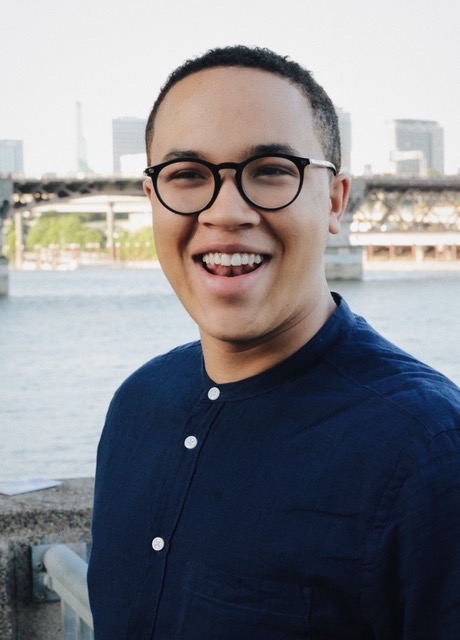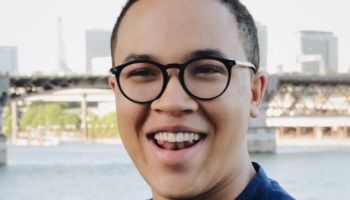
Source: Taji Chesimet / Taji Chesimet
It is in the legacy of Black power building that the youth answer the call to agitate toward a safer, more just future. Taji Chesimet (he/him/his), 19-year-old co-founder and Executive Director of Raising Justice, embodies that principle and is organizing his community to answer the call. Like so many young people, Taji’s grown up in what seems like a never-ending reckoning around racial hatred and state violence in this country. But he’s decided early on that his life will be one of service so that the next generation inherits something better, and more just.
MORE: CASSIUS presents Young Black Icons
A freshman at the University of Chicago studying Critical Race and Ethnic Studies, Taji has been organizing young people in his hometown of Portland,Oregon and other cities for several years. But it was after police shot and killed Quanice Hayes, a 17-year-old Black child in 2017, that Taji took his leadership to the next level. Along with co-founder Britt Masback, they founded Youth Educating Police ( now Raising Justice), to help combat racial, generational, and class injustice in this country.
Their work with local police in Portland garnered national attention. Rooted in cultural competency and the principles of restorative justice, they were providing educational opportunities to help officers better understand youth of color and the biases that are inherently embedded in the institution of policing.
“When we started the organization was heavily focussed on training police around their interactions with youth,” Chesimet said. “But we transitioned from that this past summer. We saw our trainings used and tokenized by the police, as opposed to actually using them to change things.”
Now, Raising Justice focuses on other tactics as well, including policy work centered on the divestment of funds from police budgets and the reinvestment in community-centered services, the kind that Taji recalls wishing there were more of when he was younger.
Raised on the North side of Portland, an area that was historically Black and Brown, Taji had several experiences, including navigating the realities of gentrification, that impacted his family. During his middle school years, he remembers seeing members of his own family push back and advocate for their community in ways that changed what he thought was possible.
“Around the time we moved to North Portland, I began to understand my identity more and how the dynamic of being Black affected me in relationship to the system. But at that same time, my mom, who is legally blind, began advocating for her own community’s access, rights and justice,” Chesimet said. “It was pivotal for me seeing my mom do that. She really lives a selfless life in the sense of always wanting to be in service to her community. We work on somewhat different issues now, but it’s rooted in the same desire to see our communities have more access.”
Taji has been involved in countless organizations, including Black Male Achievement, a city-funded endeavor in Portland and the What Now symposium in 2017 and 2018. While his consciousness and leadership abilities were growing , he was always moving further into adolescence which for everyone, comes with unique challenges.
“Outside of school I was involved in some nefarious adolescent things that didn’t necessarily result in me being adjudicated, but I did have to have my record expunged for crimes in my middle school years,” Chesiment said. “Thankfully the incidents were in Vancouver, Washington where they have a lot more rehabilitative programs rather than punitive programs for youth.”
Taji counts himself blessed to have had access to the kind of support and resources necessary to ensure his mistakes as a child didn’t result in the loss of his freedom or his life. According to national data from organizations like the Advancement Project and the National Education Association that are striving to end the criminalization of Black and brown children, Black students are disportionately criminalized and incarcerated for behavioral and low-level offenses that white students commit at higher rates.
“Too many young people aren’t afforded the privilege of making mistakes and being allowed to grow up and learn from them,” Chesiment said.
This past summer, the COVID-19 pandemic, racial justice uprisings and presidential election spurred millions of people to take action, forcing this country to yet again, reckon with its legacy of violence toward Black and Brown people. Chestimet spoke of challenges of organizing in 2020, but also the opportunity to ground people across the country in a shared politic around race, class and gender.
“Doing this work since 2017, it was always a challenge fighting against a lot of the narratives perpetuated by police or other institutions in terms of why the change we wanted couldn’t happen.But in a global pandemic where everyone’s cooped up and reflecting on their own lives, it was inevitable that we’d have to deal with the disparities that COVID-19 exposed, and that the failures of the system would be magnified,” Chesimet said.
Taji shared that due to the new digital space we found ourselves in this year, he was able to connect with even more young people across the country. “This collaborative national work was really important , but it was only possible because there was a heightened interest and desire across the country to see change that was actually intersectional.”
As Taji continues his studies at the University of Chicago and moves further into his organizing work, he’s encouraged by what he’s seen happen the past few months, and is also ready to roll his sleeves up to keep on fighting. When asked what he’d tell those who came before him and those coming after him, sentiments of deep gratitude and hope hung heavy.
“I know I don’t have the answers so I desire to work alongside elders— to talk and be in collaboration with them. There were a lot of tools and resources provided to us by previous generations that I needed to be successful. So for that I’d say thank you. And to others looking to get involved I’d say that the more we articulate the systems inequities… I have to believe the more we’ll have a chance to create the change we want to see. We have to stay hopeful.”
Click here to learn more about Cassius’s Young Icons. They’ve got next.
















